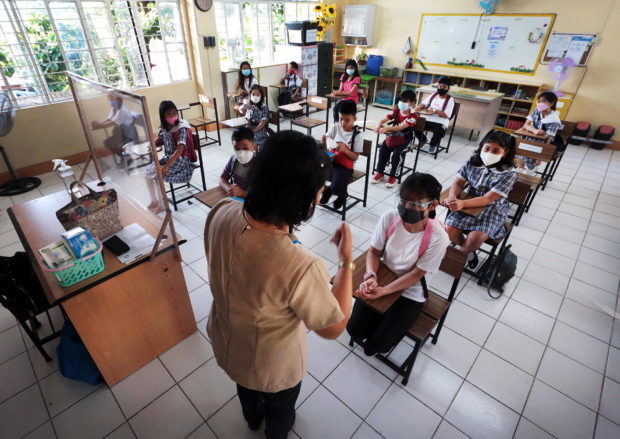Learning ‘3 Rs’ a struggle for kids back in schools

Students and teachers at the General Roxas Elementary School in Quezon City conduct a dry run of face-to-face class in this photo taken on February 8, 2022, to familiarize the students on the new rules in the conduct of classroom learning in the time of the pandemic. The Department of Education (DepED) has authorized its regional units to start the “progressive expansion phase” of limited in-person classes since last year. INQUIRER FILE PHOTO / GRIG C. MONTEGRANDE
MANILA, Philippines — Back in their classrooms, many schoolchildren are finding it hard to read and pronounce words correctly or perform basic arithmetic operations, a sign of huge “learning gaps” after two years of remote schooling, according to teachers and education officials.
Some public school teachers have observed significant deficiencies in the reading, writing and numeracy skills of their students from Grade 2 to Grade 11, based on preliminary assessments of their current level during the first week of classes.
Ruby Bernardo, a Grade 10 Filipino teacher, said some of her students, who had grown accustomed to either module-based or online learning, were having a difficult time expressing themselves during face-to-face classes.
Failing math
“You would expect them to have a higher order thinking skill somehow but the students find it hard to do simple pronunciation,” she told a recent virtual press briefing of the Alliance of Concerned Teachers.
Meanwhile, mathematics teacher Melanie Balahadia said only 21 percent of selected Grade 2 students passed the literacy and numeracy assessment at her school last June.
“Most of the students failed, especially in mathematics. This means that the pandemic had a huge effect on the kids, and there is really a learning gap,” Balahadia said in a phone interview on Monday.
The Department of Education (DepEd) admitted that it found “alarming” reports of such learning gaps, which prompted the agency to develop a “learning recovery and continuity plan (LRCP).”
It blamed the drastic shift to remote schooling for the learning gaps suffered by students, after a series of government-enforced lockdowns forced campuses to close down beginning in 2020 until in-person classes resumed in most schools on Aug. 22, the start of the 2022-2023 school year.
By Nov. 2, all public and private schools are required to shift entirely to face-to-face classes, except those found by DepEd to have special circumstances and may maintain a blended setup of remote and in-person schooling.
“The COVID-19 pandemic disrupted the delivery of learning at an unprecedented scale not just in the Philippines but worldwide. The abrupt change in the learning delivery landscape from face-to-face learning to distance learning impacted learning outcomes,” the agency said in a letter to the Inquirer.
DepEd defines learning gaps as the difference between what the students are expected to have learned in a particular grade level compared to what they have learned up to that point.
“These gaps are often compounding. Hence, DepEd developed its learning recovery and continuity plan,” it said.
The agency intends to focus on three specific areas to address the gaps: learning remediation and intervention; socio-emotional function, mental health and well-being; and the professional development of teachers.
Can’t write in cursive
Aside from reading and numeracy, the writing skills of students also appeared to have been affected, as some of them were unable to practice cursive writing.
“It is understandable if the students are now in Grades 3 to 5 and they don’t know how to do cursive because cursive writing starts in the middle part of Grade 2. Because of the pandemic, they weren’t able to practice it,” she said.
Balahadia said parents were usually not knowledgeable in standard cursive writing so they wouldn’t be able to help their children practice the skill under a remote learning setup.
Not knowing how to write in cursive affects a learner’s ability to read as well.
“Teachers in the intermediate grade levels tend to do cursive and it could possibly affect the performance of the child if he or she does not know how to read the teacher’s writing,” Balahadia said.
Profiling, clustering
According to DepEd, among the strategies being taken to accelerate learning and address these learning gaps in reading, writing and numeracy are the profiling and clustering of students based on their academic needs.
The agency said it was also intensifying the implementation of the “Every Child a Reader” program and expanding learning times to improve students’ reading and numeracy skills.
“Field offices are also mandated to contextualize the learning recovery plan making it more responsive to their context,” DepEd said.
The first phase of the LRCP started after the end of the previous school year in June through the conduct of remedial classes for students who did not meet expectations in one or two subjects.
Meanwhile, those who received a grade of 75 to 79 were provided with “enrichment classes” on a voluntary basis. In June, the latest World Bank report on the quality of education in the Asia-Pacific region found that nine out of 10 Filipino children were still struggling to read simple texts by age 10.The report identified the Philippines as one of the countries with the highest rates of “learning poverty” in the region and among lower-middle income economies.
Learning poverty means being unable to read and understand short, age-appropriate texts by the age of 10, or between Grade 4 and Grade 5 under the country’s K-12 system.